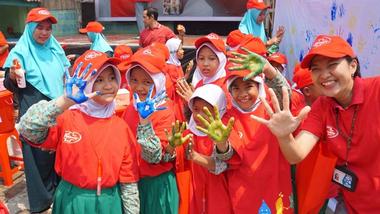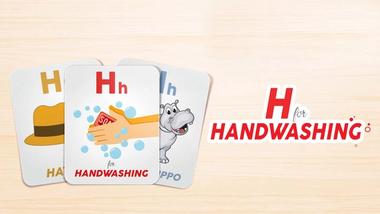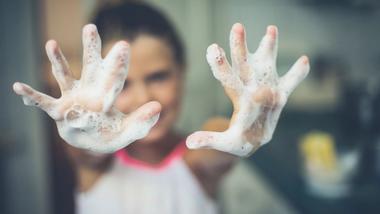
Handwashing for life
Average read time: 12 minutes
Through Lifebuoy’s Social Mission programmes and communications, we’ve helped more than 1 billion people develop good handwashing habits.

Handwashing with soap saves lives
According to UNICEF, every 30 seconds a child somewhere in the world dies from pneumonia or diarrhoea. They are two of the top killers of children, with over 1.2 million under five dying each year.
1 Child dies from pneumonia or diarrhoea every 30 seconds
Yet the simple practice of handwashing with soap is the single most cost-effective intervention to prevent child deaths. It is proven to reduce diarrhoeal disease by up to 45%1 and pneumonia by 23%2.
Goal 6 of the UN Sustainable Development Goals (SDGs) recognises handwashing with soap as crucial to better health too. Hands are the principal carriers of disease-causing germs and it’s estimated that if handwashing with soap is widely practised, approximately 230,000 deaths could be averted every year3.
With over 125 years of research and heritage in personal health and hygiene, we have long been taking action to combat illnesses and deaths caused by preventable infections.
A track record of proven outcomes
We achieved our Unilever Sustainable Living Plan (PDF 8.02 MB) target to help more than 1 billion people develop good handwashing habits, reaching over 486 million people in 30 countries through our on-ground handwashing behaviour change programmes across Asia, Africa and Latin America. In addition, we reached around 587 million people through TV adverts that have proven to improve handwashing habits.
Our decade-long Unilever Sustainable Living Plan encouraged people to develop better handwashing habits in the most vulnerable communities with the help of over 30 partners across government, NGOs and academics. All our handwashing programmes follow our Five Levers for Change (PDF 3.85 MB) behaviour change methodology.
Lifebuoy is one of the largest contributors to Unilever’s new Health and Wellbeing Compass goal to improve lives of one billion people per year.
Take action through our brands to improve health and wellbeing and advance equity and inclusion, reaching 1 billion people per year by 2030.
We will focus on: gender equity; race and ethnicity equity; body confidence and self-esteem; mental wellbeing; hand hygiene; sanitation; oral health; skin health and healing.
Within this, Lifebuoy aims to reach 500m people every year with communications to help improve hand hygiene behaviour and help advance health access initiatives through powerful TV commercial communication, in addition to our long-standing behaviour change programmes.
We’ve long believed that mass-scale TV advertising can contribute to changing handwashing behaviour and in 2019 this was confirmed by a peer-reviewed research study on the effects of mass-scale media interventions on handwashing with soap among mothers. Lifebuoy’s handwashing interventions have been proven to improve health outcomes, as shown by a clinical trial.
We’re keeping our ambitions high and continuing to evolve as we deliver against our new goal.
Lifebuoy’s response to Covid-19
Inspired and driven by Lifebuoy’s purpose, at the start of the pandemic in early 2020, we put out public service announcements in 17 countries. These followed public health guidelines to raise awareness of handwashing with soap as a key measure to stay protected.
Our message was clear: wash your hands with soap, not just Lifebuoy, but any soap, even that of our competitors – something we’ve never done before. Within 24 hours this public service announcement was shared all over the world, helping us reach 1 billion households. In 2021, our It’s in Your Hands campaign continued to emphasise the need for handwashing alongside social distancing, mask-wearing and vaccination.
In tandem, Lifebuoy responded to Covid-19 by strengthening its supply chains to keep our factories running – and crucially, to keep our products available. We also donated over 20 million products, including soap, hand sanitisers and antibacterial wipes to various organisations and initiatives, including schools, hospitals, the elderly and taxi drivers across Asia Pacific, the Middle East and Africa.
H for Handwashing

H for Handwashing was built on the premise that effective behaviour change must start at an early age. We took inspiration from UNICEF’s early childhood development research which demonstrates that the right support and interventions in the early years of life can significantly boost child development, helping children to grow, learn and thrive.
For generations, children have been taught letters of the alphabet through simple associations such as ‘A’ is for apple, ‘B’ for ball and ‘C’ for cat. To make handwashing a part of their everyday lives, Lifebuoy’s award-winning H for Handwashing campaign aims to transform the letter H into a symbol for handwashing, so that H not only stands for Hat, Horse or Hippo, H stands for Handwashing!
At the heart of the idea is the simple intention to integrate hygiene into the school curriculum, so that people never forget the biggest lesson that we’ve learnt during the pandemic – namely the importance of washing hands with soap to stay protected from infection.
In a span of two years, we have reached more than 12 million children with a host of educational material that’s proven to improve handwashing behaviours. We’ve made use of comics, posters, playbooks, games, flipcharts, activity sheets and stickers created by a specialist children’s communications agency. We also launched a first of its kind downloadable H is for Handwashing Alphabet Book endorsed by top child behaviour change expert and author on early childhood and infant development, Roberta Golinkoff.
Our advocacy efforts to integrate hygiene into curricula across some of our key markets, such as India, South Africa and Ethiopia, have been well received. For example, in South Africa we have strengthened our partnership with the Department of Basic Education and UNICEF under the National Schools Hygiene and Sanitation programme by incorporating hand hygiene communication in textbooks.
Amid a generation-defining pandemic, this powerful H for Handwashing movement is equipping future generations with the unforgettable lesson that handwashing with soap safeguards their health and wellbeing.
Khim Yin Poh, Lifebuoy’s Global Brand Vice President
Play supports wellbeing
We know that play improves the cognitive, physical, social, and emotional wellbeing of children and young people. Through play, children learn about the world and themselves. They also learn skills they need for study, work and relationships, such as confidence. Our research-based digital games are fun and interactive and star Sesame Workshop’s muppets Elmo, Raya, Cookie Monster and Grover. They encourage children to practise handwashing, and using games makes learning fun and memorable.
This collaboration marks Lifebuoy’s first digital behaviour change programme and it has delivered a significant improvement in children’s engagement with handwashing.
Digital games show impressive results
Through a study conducted via our digital games, we’ve been able to reinforce handwashing behaviour and enhance knowledge of handwashing.
The study showed impressive results:
- 94% of caregivers reported that they saw a positive change in their child’s handwashing with soap behaviour
- 82% of caregivers said their child tried a handwashing skill emphasised in the games
- 91% of caregivers said their kids learnt something new from the games
- 93% of caregivers stated that their kids found the games to be fun and engaging
- 92% of caregivers said they would recommend these games to other parents and caregivers.

Harnessing the power of digital
Lifebuoy’s unique mobile programme Mobile Doctarni is a voice-based service that delivers critical health and hygiene information to mothers living in rural parts of the world, where access to doctors, information and TV is limited.
Created by Lifebuoy, this innovative mobile programme provides mothers with time-sensitive information tailored to her stage of pregnancy or the age of her child, thus replacing the need for costly field visits by healthcare workers.
Mobile Doctarni delivers clear improvements in practices
Evaluation of the Mobile Doctarni programme showed strong results in handwashing behaviour at key occasions.
- The programme was able to significantly increase handwashing with soap/liquids by about one occasion per day among mothers.
- Specifically among pregnant or new mothers, the frequency of handwashing vastly improved among participants exposed to the campaign – an average of 1.5 times increase in handwashing frequency.

The Hygiene & Behaviour Change Coalition
In March 2022, Unilever and the UK’s Foreign, Commonwealth & Development Office announced a second phase of the Hygiene & Behaviour Change Coalition (HBCC). Its aim is to reach the general population in lower- and middle-income countries, particularly those with lower Covid-19 vaccination rates. It includes a focus on vulnerable groups such as the elderly and people with disabilities.
The Coalition hopes to combat the omicron variant and the risk posed by other coronavirus variants by delivering hygiene and behaviour change interventions with the help of ten NGO partners such as Save the Children, GIZ, BBC Media Action and Water & Sanitation for the Urban Poor (WSUP). Partners draw on the hygiene behaviour change expertise and educational material of many brands, including Lifebuoy and Domestos.
Lifebuoy’s new telehealth partnerships
Lifebuoy is progressing its social mission by supporting more people to improve their health and hygiene through its telehealth partnerships.
Getting seen by a doctor is a challenge across the world, especially in some of Lifebuoy’s biggest markets. In Vietnam, for example, there are only eight doctors for every 10,000 patients; in Indonesia, the figure’s just three per 10,000. With healthcare systems under enormous strain and intermittent lockdowns restricting travel, many people are using telehealth apps and websites to book telephone consultations.
Lifebuoy has teamed up with leading telemedicine providers in India, Indonesia, Vietnam, Bangladesh and Pakistan to expand the reach of these vital platforms – and we’ll continue to scale up availability to further democratise healthcare. Partnering with digital healthcare providers is helping us evolve Lifebuoy from the world’s leading hygiene soap brand to one that is also helping improve access to healthcare for millions of individuals.

How does it work? Lifebuoy’s packaging and commercials drive people to the platforms, where they can receive free doctor consultations and healthcare advice. Lifebuoy’s telehealth activations have reached almost 300 million people since 2020 and have formed a large part of our Covid-19 response.
We see access to healthcare services as an important way to grow household penetration of our brands by providing vital services to communities. Alongside expanding the H for Handwashing movement, digitalising Lifebuoy’s behaviour change programmes will help us to scale up and reach more schools, mothers and children in a more efficient and cost-effective manner. We’ve seen a large increase in brand power – a measure of brand attractiveness and therefore a critical factor in brand growth – because of our efforts.
For over a century, Lifebuoy has used its behaviour change expertise to help inspire more people to wash their hands with soap more often. Now we’re committed to improving access to healthcare too.
Triveni Rajagopal, our Digital Transformation Lead for Personal Care
Partnerships tackling cross-cutting issues linked to hygiene
In recent years, we’ve leveraged cross-sector partnerships to help us to drive greater systemic change around the world. We’re expanding our partnerships’ portfolio beyond hygiene to improve adjacent health-related behaviours. That means forging impactful partnerships that focus on holistic health where hygiene has a cross-cutting impact, enabling us to tackle hygiene-related health issues such as malnutrition and immunisation.
Lifebuoy partnerships have grown in scale, innovation and thought leadership, and form the backbone of our handwashing behaviour change programmes. These partnerships with governments and NGOs enable us to have a greater impact and reach those most in need, playing a key role in impacting the Sustainable Development Goals.
A good example is our focus on mothers. Every year, 2.5 million babies die before turning one month old – and almost 350,000 of these deaths are due to infections. Research shows that 41% of deaths could be prevented simply by helping new mums and midwives change their handwashing behaviour. Over the past decade, we’ve reached more than 20 million mothers across Asia and Africa, providing them with hygiene education vetted by USAID through community visits and neonatal clinics.
Helping mothers in emergency settings
Lifebuoy and Oxfam have developed a customised handwashing programme called Mum’s Magic Hands. Its interactive storytelling approach uses field-tested, emotional and health motivators to promote effective handwashing in communities affected by emergencies.
Results from a structured observation study showed significant increases in handwashing with soap before eating and preparing food, and after using the toilet:
- 18% increase in handwashing with soap before eating
- 17% increase in handwashing with soap before preparing food
- 45% more mothers observed washing hands with soap after using the toilet.

Tackling blindness through hygiene practices
Hand and face washing can prevent the world’s leading cause of preventable blindness: trachoma. Globally, 158 million people are at risk and the disease is endemic in some of the poorest areas of the world, including countries in Africa and Asia.
Lifebuoy and Sightsavers partnered to promote a hand and face hygiene behaviour change programme in schools to support the elimination of trachoma.
We’ve reached more than half a million people through this partnership across Ethiopia, Zambia and Kenya.
The impact has been impressive as the schools in which the intervention was implemented saw a 40% difference in hand and face washing compared to schools that did not receive the intervention.

Helping children thrive through soap and vaccines
We’re working with Gavi, the Vaccine Alliance to promote handwashing with soap and immunisation together – as they are two of the most critical and cost-effective child survival interventions.
Safal Shuruaat ('Successful beginning') is a programme in India that is based around parents’ aspirations, employing a shift in communication from ‘child survival’ to ‘child success’. We created digital content using recognizable and relatable games like ‘snakes and ladders’ to demystify often complex concepts, alongside short ‘edutainment’ films that talked about barriers to habit formation in an easy-to-understand way. The programme also made use of mobile reminders to continue to reach communities throughout the Covid-19 pandemic.
Findings from Safal Shuruaat
Safal Shuruaat has successfully reached more than 5 million people and the results from the independent evaluation have been very promising:
- fivefold increase in handwashing with soap after defecation
- parents exposed are three times more likely to be knowledgeable about the importance of handwashing with soap
- knowledge around timely routine immunisation improved twofold.

Now in Indonesia, we’re using our learnings to expand Safal Sharuaat’s award-winning programme to help secure a future where people’s health is protected through vaccines and good hand hygiene. Unilever has pledged €3 million to the programme, which Gavi will match.
Tracking what works
Monitoring handwashing with soap is important as it enables us to learn from our programmes. However, measuring it is difficult, particularly as many people don’t like to admit that they don’t wash their hands.
Having run a series of evaluations (PDF 4.8 MB) of our programmes and partnerships over several years, we’ve tested and validated an alternative method of measuring handwashing with soap that is both unique and robust. We use our proven methodology of sticker diaries, in which respondents are asked to track a range of daily activities in picture form, without knowing which behaviour we’re interested in.
We’ve found this method prompts reliable recall of a variety of behaviours and avoids the reminder that this is a study (which can often influence responses to give an unrealistic picture of what people actually do).

Rabie, T and Curtis, V. (2006): Handwashing and risk of respiratory infections: a quantitative systematic review. Tropical Medicine and International Health, 11(3), 258-267.
Luby S, et al. The effect of handwashing at recommended times with water alone and with soap on child diarrhea in rural Bangladesh: An observational study. PLoS Med, 2011; 8(6).
Unilever calculation based in part on information reported by NielsenIQ through its ScanTrack, MarketTrack and Retail Index Services for the Skin Cleansing Category (markets defined by Nielsen or Unilever) for the 52-week period ending: Ghana - Jun 2020; Egypt - Sep 2020; Denmark, Norway, Saudi Arabia, Sweden and, UAE - Nov 2020; Argentina, Australia, Bangladesh, Brazil, Canada, China, France, Germany, Great Britain, Greece, Hungary, India, Indonesia, Italy, Malaysia, Mexico, Netherlands, New Zealand, Nigeria, Pakistan, Peru, Philippines, Russia, South Africa, Spain, Switzerland, Taiwan, Thailand, Turkey, and Uruguay - Dec 2020; Vietnam, Kenya, Poland, Hong Kong - Jan 2021; Austria, Belgium, Chile, Portugal, Singapore and, South Korea - Feb 2021; US - Mar 2021. (Copyright © 2021, NielsenIQ).
